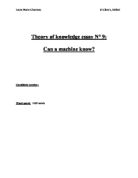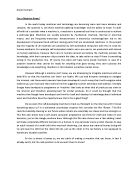In what sense, if any, can a machine be said to know something? How can anyone believe that a machine can think?
“In what sense, if any, can a machine be said to know something? How can anyone believe that a machine can think?”
A knowledge issue that can be derived from this question is: do mathematical predictions obtained by machines such as computers or calculators constitute knowledge? One claim to this issue is that mathematical knowledge must be true because it corresponds to phenomena predicted by formulas and mathematical belief. For example, in the field of demography, models and formulas can be used to predict the growth and decay of populations. Mathematical information is critical to such predictions. By evaluating existing phenomena in population growth, computer models sanctioned by the UN were able to give the exact date that the world population surpassed six billion, on October 12, 1999 years in advance. This is evidence that observable trends and truths in previous data can be summarized and applied to other scenarios by inductive reasoning. This is a form of synthetic truth and a posteriori knowledge. In this sense, machines do have knowledge. They are able to summarize trends and indicate truths. An implication of this claim is that predictions made by machines hold true. This is often not the case, giving rise to the counterclaim that no truth exists in mathematical knowledge. The predictions of machines are purely theoretical. They are not obtained by perception, language, or emotion, three primary ways of knowing. The fourth way of knowing, reason, is also questionable in machines. The reasoning of mathematical models comes from the initial programming and setup of the computer. The reasoning required to construct a program to make sense of population data came from the people who designed the program. In a sense, the machine only takes that reasoning and extends it over more data than the people themselves could process. Wrong predictions also conflict with Plato’s definition of truth which holds that truth must be eternal. Once proven wrong, the truth is no longer eternal.







